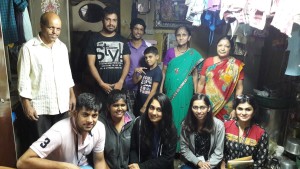Slum dwellers are technologically un-savvy, mostly concerned with arranging daily food and basic necessities and would not have a reason to care about exorbitant luxuries like smart phones. With these preconceived notions, Mrs. Piyul Mukherjee, founder of Quipper Research, sent Northpoint students down to the Khandala slums for qualitative consumer research. A village with farms and tractors was imaginable but what exists under the corrugated tin roofs of an urban slum was a mystery.
Qualitative research we were told aims to understand the consumers’ lives from within. It goes beyond numbers and sumptuously elucidates the consumer psyche. We were also warned that great surprises lay ahead. We went in prepared to elicit from our subjects all reasons behind their use of feature phones. Handy, easy to use, long lasting and affordable- we had reasonable belief that these would emerge as the top findings.
We bought sweets, snacks and goodies to appease our hosts. We hesitantly ventured into the narrow alleys between the shacks and shanties, one person at a time. What followed was an evening full of humbling discoveries. The one room, one kitchen households had limited furniture but boasted television sets and multiple smart phones, often as many as five. Feature phones were either non-existent or only used by the older generation, not unlike our own homes. Our initial hypothesis stood nullified; we were forced to shift our lens in the midst of our fieldwork.
‘Ethnocentrism’- we read the definition of this term before leaving but understood it only after returning. To assume, judge and weigh someone else’s actions from one’s own perspective is to be ethnocentric. Urban slum dwellers aspire to the same modernity that gated community residents aspire to. The former buy Vivos and Oppos while the latter splurge on Apples. The desire for big screens and status recognition remains constant across the two.
Knowledge is volatile, reality transient, consumers variegated and assumptions deceptive. To truly know the consumer is to question the obvious, and to “leave no answer unquestioned”.
– Indu Upadhyay

